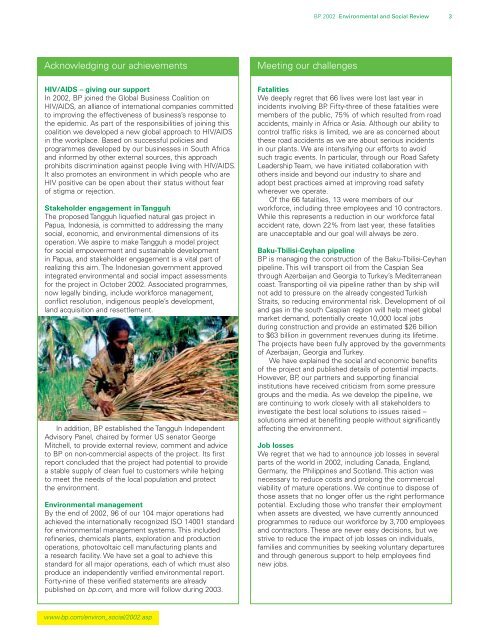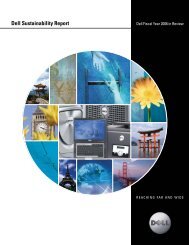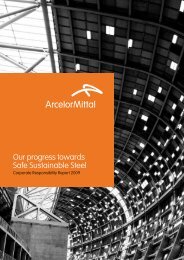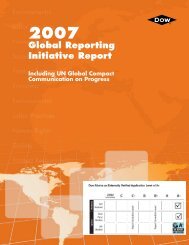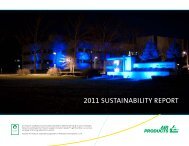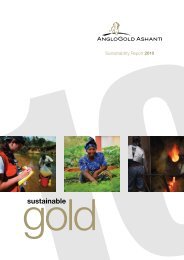English (pdf, 894KB) - BP
English (pdf, 894KB) - BP
English (pdf, 894KB) - BP
Create successful ePaper yourself
Turn your PDF publications into a flip-book with our unique Google optimized e-Paper software.
<strong>BP</strong> 2002 Environmental and Social Review 3Acknowledging our achievementsMeeting our challengesHIV/AIDS – giving our supportIn 2002, <strong>BP</strong> joined the Global Business Coalition onHIV/AIDS, an alliance of international companies committedto improving the effectiveness of business’s response tothe epidemic. As part of the responsibilities of joining thiscoalition we developed a new global approach to HIV/AIDSin the workplace. Based on successful policies andprogrammes developed by our businesses in South Africaand informed by other external sources, this approachprohibits discrimination against people living with HIV/AIDS.It also promotes an environment in which people who areHIV positive can be open about their status without fearof stigma or rejection.Stakeholder engagement in TangguhThe proposed Tangguh liquefied natural gas project inPapua, Indonesia, is committed to addressing the manysocial, economic, and environmental dimensions of itsoperation. We aspire to make Tangguh a model projectfor social empowerment and sustainable developmentin Papua, and stakeholder engagement is a vital part ofrealizing this aim. The Indonesian government approvedintegrated environmental and social impact assessmentsfor the project in October 2002. Associated programmes,now legally binding, include workforce management,conflict resolution, indigenous people’s development,land acquisition and resettlement.In addition, <strong>BP</strong> established the Tangguh IndependentAdvisory Panel, chaired by former US senator GeorgeMitchell, to provide external review, comment and adviceto <strong>BP</strong> on non-commercial aspects of the project. Its firstreport concluded that the project had potential to providea stable supply of clean fuel to customers while helpingto meet the needs of the local population and protectthe environment.Environmental managementBy the end of 2002, 96 of our 104 major operations hadachieved the internationally recognized ISO 14001 standardfor environmental management systems. This includedrefineries, chemicals plants, exploration and productionoperations, photovoltaic cell manufacturing plants anda research facility. We have set a goal to achieve thisstandard for all major operations, each of which must alsoproduce an independently verified environmental report.Forty-nine of these verified statements are alreadypublished on bp.com, and more will follow during 2003.FatalitiesWe deeply regret that 66 lives were lost last year inincidents involving <strong>BP</strong>. Fifty-three of these fatalities weremembers of the public, 75% of which resulted from roadaccidents, mainly in Africa or Asia. Although our ability tocontrol traffic risks is limited, we are as concerned aboutthese road accidents as we are about serious incidentsin our plants. We are intensifying our efforts to avoidsuch tragic events. In particular, through our Road SafetyLeadership Team, we have initiated collaboration withothers inside and beyond our industry to share andadopt best practices aimed at improving road safetywherever we operate.Of the 66 fatalities, 13 were members of ourworkforce, including three employees and 10 contractors.While this represents a reduction in our workforce fatalaccident rate, down 22% from last year, these fatalitiesare unacceptable and our goal will always be zero.Baku-Tbilisi-Ceyhan pipeline<strong>BP</strong> is managing the construction of the Baku-Tbilisi-Ceyhanpipeline. This will transport oil from the Caspian Seathrough Azerbaijan and Georgia to Turkey’s Mediterraneancoast. Transporting oil via pipeline rather than by ship willnot add to pressure on the already congested TurkishStraits, so reducing environmental risk. Development of oiland gas in the south Caspian region will help meet globalmarket demand, potentially create 10,000 local jobsduring construction and provide an estimated $26 billionto $63 billion in government revenues during its lifetime.The projects have been fully approved by the governmentsof Azerbaijan, Georgia and Turkey.We have explained the social and economic benefitsof the project and published details of potential impacts.However, <strong>BP</strong>, our partners and supporting financialinstitutions have received criticism from some pressuregroups and the media. As we develop the pipeline, weare continuing to work closely with all stakeholders toinvestigate the best local solutions to issues raised –solutions aimed at benefiting people without significantlyaffecting the environment.Job lossesWe regret that we had to announce job losses in severalparts of the world in 2002, including Canada, England,Germany, the Philippines and Scotland. This action wasnecessary to reduce costs and prolong the commercialviability of mature operations. We continue to dispose ofthose assets that no longer offer us the right performancepotential. Excluding those who transfer their employmentwhen assets are divested, we have currently announcedprogrammes to reduce our workforce by 3,700 employeesand contractors. These are never easy decisions, but westrive to reduce the impact of job losses on individuals,families and communities by seeking voluntary departuresand through generous support to help employees findnew jobs.www.bp.com/environ_social/2002.asp


